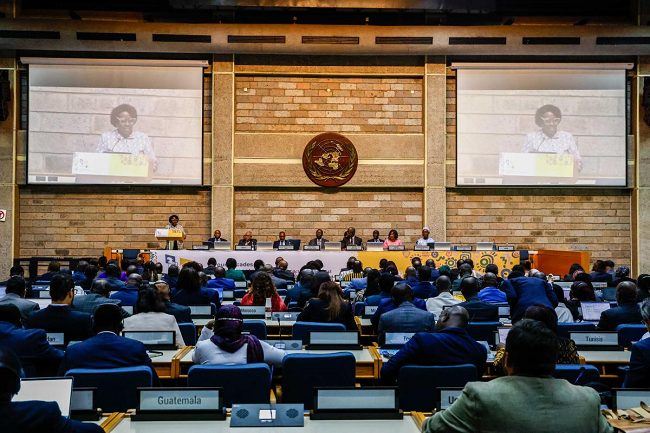The 20th session of the African Ministerial Conference on the Environment (AMCEN) concluded in Nairobi, Kenya. Ministers and representatives from 53 countries called for equitable climate finance to address the continent’s growing climate needs and urged COP30 to deliver concrete commitments in response to the escalating impacts of climate change in the region.

The Ministers noted that while Africa contributes the least to global emissions, it bears a disproportionate burden of climate impacts and receives the least contributions in climate finance. They called for increased public financing and technology transfer and development to Africa for loss and damage, adaptation, and Just transition.
The leaders reiterated calls to reform international financial institutions to align with Africa’s development priorities and mobilise climate finance through grants and concessional funding. They cautioned against loan-based financing, which has deepened debt distress in many countries.
Ministers emphasised that the Baku-to-Belém roadmap must reflect developed countries’ responsibility to provide and lead on climate finance, as outlined in the Paris Agreement. They called for full, transparent delivery on the adaptation finance doubling goal and urged that COP30 agree on a new, ambitious target that meets Africa’s adaptation needs, estimated at $845 billion between 2020 and 2035, the highest of any region.
They stressed the importance of implementing just and fair transition pathways while leveraging Africa’s natural resource base, including critical minerals, to advance Africa’s sustainable economic growth and development.
Richard Muyungi, Chair of the African Group of Negotiators, said: “COP30 must begin with the finalisation of discussions on the Global Goal on Adaptation. It is crucial that indicators reflecting how developed countries are supporting Africa, particularly through adaptation finance and technology transfer, are clearly linked to the means of implementation.
“Finance must be prioritised. We want to see progress on the Baku to Belem roadmap, specifically the operationalisation of the $1.3 trillion target set in Baku. This will enable us to move towards 2035 with a clear understanding of how these committed resources from developed countries will be mobilised. Additionally, we expect strong support for the preparation and implementation of National Adaptation Plans at the country level.
“In the Just Transition discussions, we must ensure the transition is equitable, gender-sensitive, and responsive to the needs of youth. We also want to see clean cooking solutions and energy access, particularly for the 600 million Africans currently without energy, embedded within Just Transition frameworks, with a specific target of reaching at least 300 million people.”
Jacques Assahoré Konan, Minister of Environment, Sustainable Development and Ecological Transition of Côte d’Ivoire, said: “Success for Africa at COP30 will be measured by our collective ability to speak with a united and ambitious voice, to secure concrete financial commitments for adaptation, loss and damage, and to ensure that our priorities are fully reflected in the final outcomes. It will also mean advancing climate justice by guaranteeing simplified, equitable, and direct access to climate finance, particularly for the most vulnerable countries. For us Africans, succeeding at COP30 also means being recognised as providers of nature-based, innovative, and sustainable solutions for a low-carbon and climate-resilient future.”
Christopher B. Kabah, Director of Planning & Policy, Environmental Protection Agency, Republic of Liberia, said: “For Africa, COP30 must move beyond speeches and symbolism to deliver meaningful, results-driven negotiations that produce tangible solutions to the continent’s most urgent climate challenges. It demands honest commitment from all parties, particularly developed countries, to take measurable and accountable actions that match the scale of the crisis. For Africa, true success lies in unity.
“The continent must come together with a clear, collective voice to demand fair treatment, increased climate financing, and stronger partnerships that extend beyond the walls of conference halls. Africa must also take bold steps to address climate impacts at home by integrating and scaling up indigenous knowledge systems that have long helped communities adapt to changing environments into its climate adaptation strategies.
“This year, countries that have contributed the most to global emissions must show real accountability. This means taking bold actions to cut their emissions and supporting vulnerable nations, especially in Africa, with the technologies, resources, and capacity needed to effectively respond and adapt to climate change.
“Ultimately, COP30 must reflect a fair and inclusive climate agenda. One that values Africa’s contributions, protects its people, and upholds a shared responsibility to act decisively in the face of a global threat.”
